Note: The following contains spoilers for the film Braveheart.
So let’s talk about Scottish Independence for a moment.
As many of you are probably aware, on 18th of September, 2014, the people of Scotland will take to the polls to answer one simple question: “Should Scotland be an independent country?”
Well, it’s obviously not that simple of a question. And even as an outsider I have some strong mixed feelings on the subject. On the one hand, as an American who loves Scotland and would love the opportunity to work there, I am in favour of independence since that seems quite likely to reverse the United Kingdom’s increasingly draconian policies and attitudes towards immigrants of all sorts. And on a less self-interested note, I would love to see a Scandinavian-style democracy emerge in a newly-minted Scotland, which seems a possibility (if they were not totally bankrupt, that is). That said, Scottish MPs vote in a relatively socially-liberal bloc. If they left, would likely lead to an even-more conservative United Kingdom—not something I relish the thought of.
Setting aside politics though, on a more abstract level I feel as though a separated UK would be worse off. When united, to me the UK is more than the sum of its constituent parts. And separating those parts raises difficult questions of identity for those people living in Scotland who are suddenly made to choose—if not their ethnicity, then their nationality in a way they hadn’t had to do before. For those in Scotland who identify themselves positively as British and Scottish, September 19th would be a profoundly bizarre experience of self-redefinition.
As an historian, it would also be disappointing to see the 300-year experiment, begun with the 1706 Treaty of Union, come to such an end.
And if that were to come to pass, I think that at least a small portion of the blame or credit could be laid at the feet of one anti-Semitic, misogynistic Australian: Mel Gibson.
When it was released in 1995, Braveheart was a huge success, both critically and financially. It was nominated for ten Academy Awards and won five, including Best Picture. Its release also resulted in a significant uptick in tourism for Scotland, and perhaps most importantly in our discussion here, the Scottish National Party jumped in the polls almost overnight. As Colin McArthur wrote in his book Brigadoon, Braveheart and the Scots: Distortions of Scotland in Hollywood Cinema, Braveheart’s effect on Scotland was “seen by some as manna from heaven and others as an unmitigated curse.”
Among medieval historians, Braveheart is a joke.
Its inaccuracies are legion—and not just in the little incidental ways that are easy to ignore. To recap briefly:
- The film is not based on what we actually know of Wallace’s life, but loosely based on an epic poem written 200 years after Wallace’s death: The Actes and Deidis of the Illustre and Vallyeant Campioun Schir William Wallace, by a poet known to us as “Blind Harry”. To say Harry’s poem plays fast-and-loose with facts is a wild understatement.
- Moreover, the Scots hadn’t worn blue woad for 1000 years.
- And they would not wear kilts or belted plaids for another 300 years.
- The Battle of Stirling Bridge in the film misses out the city Stirling entirely.
- It also has no bridge.
- Wallace’s subsequent raid never reached York.
- Princess Isabelle was three years old at the time, which makes her affair with Wallace in the film pretty creepy.
- Also on the topic of creepy sex, Jus Primae Noctis—the supposed law that gave a lord the right to the virginity of his serfs’ daughters—did not exist.*
But all of these other inaccuracies must bow and scrape before two others which have a profound effect on the messages in the film. They work by tapping into something deep within the Scottish identity that has given Braveheart such a powerful ability to shape Scottish self-conception and Scottish politics.
Major inaccuracy #1: The Scots are different.
Braveheart goes to great lengths to promote a single idea of what it means to be Scottish. In the film, the Scottish are a people on the edge of the world, wild, unkempt, barely civilized. Take Wallace’s character, for example: instead of reality, where Wallace was a local gentryman, in Braveheart he is remade as a peasant-warrior with education provided by a rich uncle. Wallace’s secret marriage in the woods connects with an idea that the Scottish are more connected to the land than their English counterparts, and his doing so in the forest before a stone cross rather than in a church are a reference to ideas of Celtic-druidic-mystical tradition which, though historically dubious, were very popular in the mid-90s.
This “mystical” connection to the land is only reinforced in the many scenes with lengthy shots of endless green mountains, such as the opening scene which is simply of the vast, craggy scenery (backed by mournful bagpipes) or the montage of Wallace climbing through the mountains. This seeks to equate the Scots with their unique landscape (though obviously not so unique—as those shots were filmed in Ireland). In battle, the difference between the Scots and English couldn’t be starker. In Braveheart the warriors fight with weapons typically associated with “barbarians” – axes, clubs, hammers, cleavers and sharpened stakes—against English swords, lances and longbows. The Scots taunt their enemies, lifting their kilts at them and screaming for their freedom in the face of armoured, uniformed English discipline. It is a war not just of English versus Scottish but of individuality versus conformity. The Scots fight not just for the right to be independent, but for the right to be Scottish.
But despite their barbarity, the Scots are shown to be far more noble than their English counterparts. The English occupiers are depicted as universally cruel, and Gibson himself described the character of Edward I in his film as a “psychopath”. One of the chief sins of the English, a surprisingly-common trope in epic films, is sexual deviancy (think of the sexually-deviant villains in 300, or Gladiator, or Spartacus or even, perhaps, The Matrix). Not only is there the previously-mentioned Jus Primae Noctis, but Wallace’s rebellion begins as three English soldiers attempt to rape his wife (the old, gap-toothed one even licking her face to add that extra creep-factor). Edward I’s son is show to be weak and ineffectual either because of or as part of the fact that he is a homosexual**, and his father seems all-too-interested in bedding his son’s young bride.
By contrast, Wallace and his pack of “noble savages” are shown to be remarkably erudite and completely chastely-hetero. Wallace, despite his rough exterior, impresses his wife and later shocks Princess Isabelle with his command of French and Latin. Wallace himself is willing to endure unspeakable tortures at the hands of the English rather than betray his principles by begging for mercy.
All of this goes some way towards painting the English and Scottish as fundamentally different people. Certainly, there are some ethnic and cultural differences between the English and the Scots, though the cultural differences are, in some ways, more pronounced today than they were during Wallace’s 13th century. This is due to the nationalist movements in the 19th century which successfully wrought Scottish and English identities, often out of whole cloth. Literally.
In reality, particularly among the upper-classes (like Wallace was), during the Middle Ages the English and Scottish were practically indistinguishable. Sometimes they were literally indistinguishable, especially along the Scottish borders; many aristocrats—both Scottish and English— held lands on both sides of the border simultaneously. However, it is a truism in life that in order to truly hate someone enough to kill them, you have to first see them as fundamentally different to you. They must not just be people with different ideas and goals, but different sorts of people entirely— or worse, sub-humans. I don’t need to go into detail to explain how dehumanizing your enemy can result in horrific atrocities.
And thus in Braveheart we see a clash not just of people, but of cultures and civilizations. The Scots are the rough-and-tumble underdogs, simultaneously noble and savage—which is, not incidentally, a way that Americans like to fantasize about their own revolution against the English. The English are conformist, abusive, deviant psychopaths. If you believe this vision of the past even a little, it is easy to see how you might not want to be in the same nation with those people.
Major inaccuracy #2: The English have always oppressed the Scots
When William challenges the English parley at Sterling, he makes a bold request.
“Lower your flags and march straight back to England, stopping at every home you pass by to beg forgiveness for a hundred years of theft, rape, and murder. Do that and your men shall live. Do it not, and every one of you will die today.”
In reality, the English, under Edward I, had invaded Scotland only the year before Wallace’s rebellion had begun. Prior to that, Scotland was a fully independent kingdom. The notion, repeated during the film in earnest tones, that their fight for independence is one of creating a new nation for themselves after countless years of oppression is ludicrous.
But while it may be ludicrous, it is powerful. Viewing the past in this way—where even the “time immemorial” of the Middle Ages carries its own long memory of oppression—grants an ancient precedent to Scottish nationalist movements. Moreover, it reconfigures the map; England is the centre, and Scotland is the periphery. Edward I’s England is reconfigured as a proto-British empire, and the Celtic peripheries are proto-colonies. In the film, the English do what they have always done, and what they continue to do: oppress those across their borders unless they are fought.
This relates clearly not only to the aforementioned American ideas about their past, but to the current Scottish concept of their relationship with their neighbours to the south. When focusing on the Scottish Wars of Independence, it becomes easy to see all of history as oppression by the centre upon the peripheries. The Act of Union which brought together the two countries was not achieved by conquest, but by a union of the crowns as the Scottish king James VI became the ruler of both Scotland and England, as James I, after the death of Queen Elizabeth I.
That is not to say the Scots do not have grievances against the English, both in contemporary politics and during the 13th century. But the way that Braveheart figures itself as the once and future story of Scotland asks the Scots to see themselves as the aggrieved party in their relationship with England not just today but for all time.
So, I’ll be blunt: Braveheart is a terrible history.
It’s terrible not just because of its myriad little historical inaccuracies, but because of the major ways in which it tried—with some success—to reshape the debate about what it means to be Scottish, both outside Scotland and within it. That debate has continued apace, and will come to a head on the 18th of September.
But allow me to be controversial here. In some ways, Braveheart is a truly great history.
Let’s ignore the historical content. Let’s even ignore the messages in the film for just a moment. It’s a good film. Despite being ludicrous, perhaps even because of it, it is emotionally engaging and moving. The simple fact that an historical film such as this may have had a small or large effect on the self-conception of an entire people, as well as the fate of their country is unprecedented. Whether it’s done in a dubious way, and to good or ill effect, as a public historian it is difficult not to respect that kind of public impact. It shows historians what can be gained—and also possibly what can be lost— from working together with Hollywood.
I say this half- with loathing and half- with awe: Mel Gibson. You sir, are a magnificent bastard.
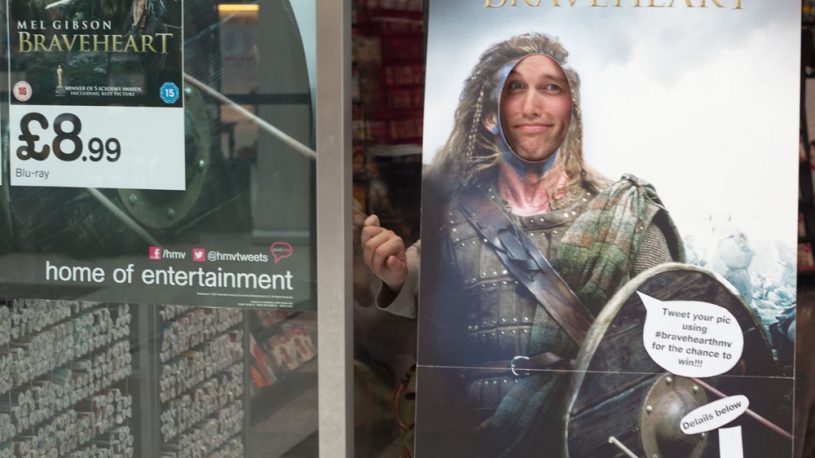
* Sure, some medieval Lords got up to all manner of shenanigans mistreating those beneath them. But the rich taking advantage of the poor is hardly unique to the Middle Ages.
** The homophobia rampant in this film is a whole other can of worms, and the topic for another post.
Head Image Credit: © Copyright Paramount Pictures, 1995.
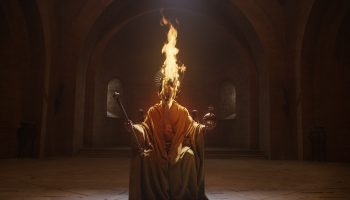
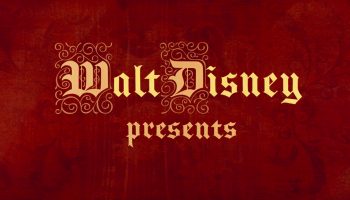
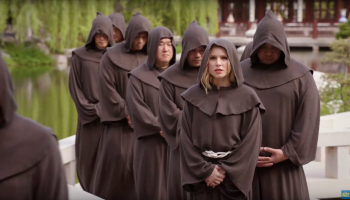
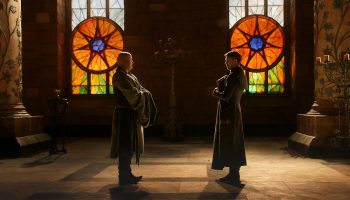

The biggest myth about Braveheart. Is that supporters of independence have any interest in the film at all.
Independence is about looking forward. It is primarily motivated by politics more than culture, about having a more a more accountable and more direct democracy. However most YES supporters actually want to free themselves from the cultural cage of shortbread, brigadoon and Braveheart and see independence as away of doing so. Freeing ourselves from the cultural ‘fairground mirror’ of the United Kingdom we will have the chance to carve out a more forward looking, more modern national identity. It is already there it just needs an opportunity to shine beyond the confines of parochialism which has been instilled in us by this Union.
The only time I ever hear Braveheart mentioned in the referendum debate is by NO supporters using it as a stick to beat YES supporters or by those who simply do not understand what is happening in Scotland.
You’re quite right. As far as I’ve seen, the supporters of independence now are avoiding referencing Braveheart, probably for some of the reasons I outline above (in that it’s a huge bag of stupid). That said, it does have a continuing effect, and I think it’s no small coincidence that when travelling in Scotland recently I found a couple of pieces of pro-independence street-art using visual references to Braveheart as well as a massive marketing push for the new Braveheart Blu-Ray in every video store I saw. You may want it dead, but sadly I don’t think it’s been erased from the collective consciousness.
And I think it’s fair to say that Braveheart had a part in reinvigorating the SNP when it was first released. Though that may have been (mercifully) been more-or-less jettisoned politically, I do wonder whether the trajectory towards the independence vote would have been exactly the same otherwise.
I do hope that if the YES campaign is successful that you are able to carve out a new, more modern identity with and for yourselves. It would be quite an exciting feat to do so, and I look forward to what sort of cultural touchstones would be employed when doing so.
Thanks for reading, and commenting.
No problem Paul. Thanks for letting me have my say.
I would be interested to see that street art and to judge for myself if it was ‘pro-independence’. Most good artists are interested in the bigger picture and I do not claim for one moment that Braveheart hasn’t affected the public conscience in Scotland. The problem I have, is that you are over-simplifying that influence. You mistakenly believe it has fueled a simple minded blood nationalism and that this is at the heart of the YES campaign.
It is a handy lie, often perpetuated by NO campaigners (the most prominent of whom is the UK government).
Both the Scottish National Party and YES campaign are based on the principles of civic nationalism. What matters in Scotland is not ‘where you come’ from but ‘where you live’. This is why the vote is confined to borders. You live here and you have a stake and a say in the direction of the country. In some ways a YES vote would be a great success for inclusive, civic values in general. The vote itself, once fully understood would be a positive way of redefining our national identity as a progressive forward thinking collection of people.
I enjoyed your analysis of the faulty history of the film, which was more detailed than most of the MANY others I have read. You would be hard pushed to find one single person in Scotland (beyond perhaps an 8 year old who has watched it for the first time) who treats Braveheart as a real historical drama. Most folk here know the inaccuracies as well as the film itself. Some of us are grown up enough to still actually enjoy the film anyway.
So Paul it is incredibly insulting to insinuate that the film is in any way influencing the way we vote in September. Please try and give 5 million of your fellow human beings a little more credit.